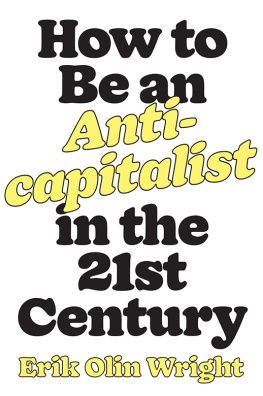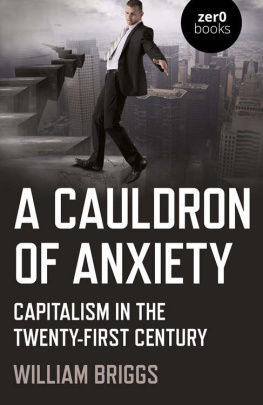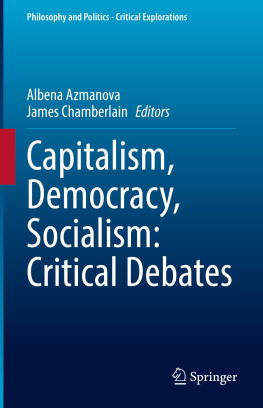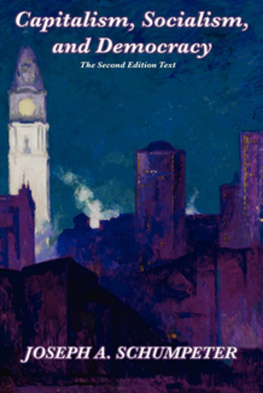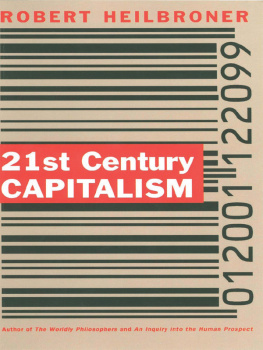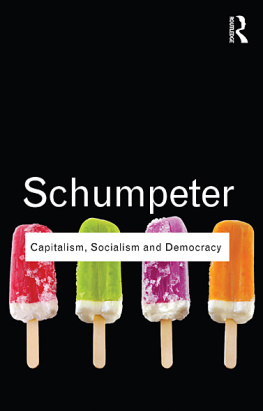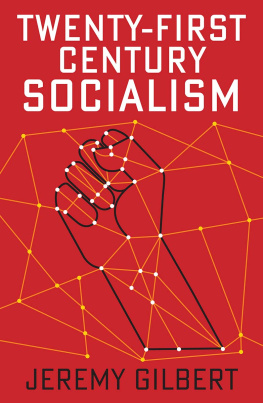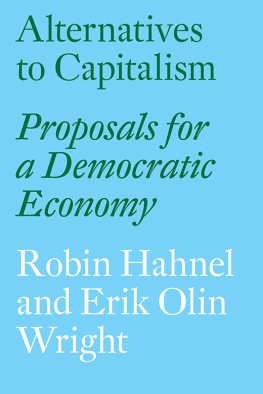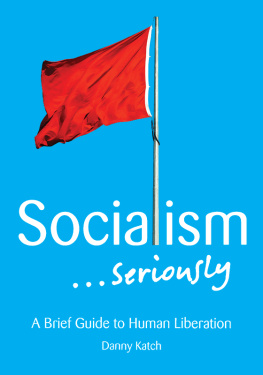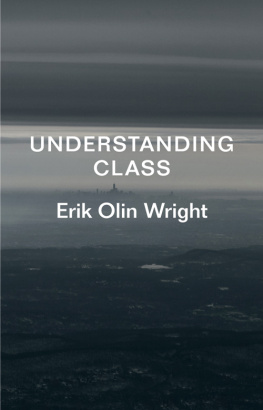Contents

How to Be an
Anticapitalist in the
Twenty-First Century
How to Be an
Anticapitalist in the
Twenty-First Century
Erik Olin Wright

First published by Verso 2019
Erik Olin Wright 2019
Afterword Michael Burawoy 2019
All rights reserved
The moral rights of the author have been asserted
1 3 5 7 9 10 8 6 4 2
Verso
UK: 6 Meard Street, London W1F 0EG
US: 20 Jay Street, Suite 1010, Brooklyn, NY 11201
versobooks.com
Verso is the imprint of New Left Books
ISBN-13: 978-1-78873-605-3
ISBN-13: 978-1-78873-607-7 (US EBK)
ISBN-13: 978-1-78873-606-0 (UK EBK)
British Library Cataloguing in Publication Data
A catalogue record for this book is available from the British Library
Library of Congress Cataloging-in-Publication Data
Names: Wright, Erik Olin, author.
Title: How to be an anticapitalist in the twenty-first century / Erik Olin Wright.
Description: London ; Brooklyn, NY : Verso, 2019.
Identifiers: LCCN 2019001983| ISBN 9781788736053 | ISBN 9781788736077 (US EBK) | ISBN 9781788736060 (UK EBK)
Subjects: LCSH: CapitalismHistory21st century. | Anti-globalization movement.
Classification: LCC HB501 .W964 2019 | DDC 330.12/2dc23
LC record available at https://lccn.loc.gov/2019001983
Typeset in Sabon by MJ & N Gavan, Truro, Cornwall
Printed and bound by CPI Group (UK) Ltd, Croydon, CR0 4YY
To my three grandchildren,
Safira, Vernon and Ida
Contents
This book was originally conceived as a streamlined distillation of the central arguments of Envisioning Real Utopias, published in 2010. In the years after that titles publication, I gave periodic talks to community groups, activists and labor groups around the world about its themes. Generally, audiences were enthusiastic about the ideas, but many people found the size and academic trappings of the book off-putting. So, I thought it would be good to write a short, reader-friendly version.
By the time I began working on this, however, my ideas had evolved sufficiently that it no longer made sense to write a book that mainly recapitulated what I had written in Envisioning Real Utopias. My focus of attention had shifted from establishing the credibility of a democratic-egalitarian alternative to capitalism to the problem of strategy, how to get from here to there. What I initially planned as a short distillation of my 2010 book had become more of a sequel.
I still wanted to write something that would be engaging to any reader interested in thinking about these issues. But I also found it difficult to write about new arguments and themes without the usual academic practices of entering into debates with alternative views, documenting the sources for various ideas that contributed to my analysis, using footnotes to counter various objections that I knew some readers might have, and so on. My problem was basically that I was writing for two distinct audiences: people who would be interested in the issues but not the traditional academic elaborations, and readers who would feel that the book was not intellectually rigorous without those elaborations.
The solution I came up with was to plan a book with two parts. Each part would have the same identical chapter titles. In Part 1, there would be virtually no references, no footnotes, minimal discussion of the pedigree of specific ideas, and only brief discussions of debates or objections where this was essential for clarifying the argument. In Part 2, each chapter would begin with a one- or two-page summary of the basic argument of the corresponding chapter in Part 1, followed by an exploration of the academic issues left out of Part 1. My goal was for Part 1 to still fully reflect the complexity of the theoretical ideas in the analysis, but to avoid the digressions and academic encumbrances. It would not be an oversimplification of needed complexity. The editors at Verso were enthusiastic about this idea and agreed that when the book was published, Part 1 would be published as a short, inexpensive stand-alone volume, and parts 1 and 2 would be published together as a separate book.
My strategy for actually writing the book was to first write a good draft of every chapter in Part 1, keeping notes on what issues needed discussion in the corresponding chapter in Part 2. I knew that inevitably I would make revisions to the Part 1 chapters once I got into the weeds of Part 2, but still it felt best to get the whole analysis laid out first.
By March of 2018, I had what I felt were solid drafts of the first five chapters. The chapter that is the centerpiece of the book, Chapter 3, Varieties of Anticapitalism, had gone through many iterations and had been presented in different forms in dozens of public presentations. Chapters 1, 2 and 4 all have a fairly close relationship to what I had written in Envisioning Real Utopias, and I felt they were also well worked out. Chapter 4 in particular is largely a distillation of the ideas in chapters 5 to 7 of the earlier book. Chapter 5, on the problem of the state, explores issues I had not discussed systematically in the earlier book but had written about elsewhere, so I felt that this chapter was also in good shape. Chapter 6 remained to be written. It engaged an issue that I had not dealt with in a systematic way beforethe problem of forming the collective actors capable of acting politically in an effective way to transform capitalism. But I figured even if I did not have anything very original to say on this critical subject, I could at least clarify the issues in play.
In early April I was diagnosed with acute myeloid leukemia. Acute myeloid leukemia cannot be kept at bay with episodic treatments over an extended period of time. The only strategy is to have a bone marrow stem cell transplant. If this is successful, I will be cured; if not, I will die. The prospects of survival are not remote, but far from certain.
When I received the diagnosis, I contacted Verso and explained the situation. The actual stem cell transplant was several months offthere are a number of rounds of chemotherapy needed to set the stage for the transplantand I hoped this would give me time to write a draft of Chapter 6. I proposed that when I had completed the manuscript, Part 1 be published as a short book without waiting for Part 2. If all goes well and the transplant is successful, then sometime in the future I can write Part 2 if this still seems worthwhile.
It is now the end of July. It has been a challenge for me to work on the chapter much as I wanted to finish the book. There were periods when I could write with focus and energy for a few hours, but also many days when this was impossible. The chapter has not gone through the public and private dialogue that has always been an integral part of my writing, but I think it serves the needed purpose.
One note on the title of this book, How to Be an Anticapitalist in the Twenty-First Century. In the book, I argue in favor of democratic market socialism, understood as a radical form of economic democracy. The book could, therefore, have had the title How to Be a Democratic Socialist in the Twenty-First Century. I decided to use the more encompassing term anticapitalist because much of the argument of the book is relevant for people who oppose capitalism but are skeptical about socialism. I hope that my arguments convince at least some people that radical socialist economic democracy is the best way of thinking about a realizable destination beyond capitalism, but I did not want the book to seem relevant only to people who already agree with that vision.

